Class 10 Exam > Class 10 Notes > Biology for GCSE/IGCSE > Hormones in Humans
Hormones in Humans | Biology for GCSE/IGCSE - Class 10 PDF Download
| Table of contents |

|
| Hormones & Their Associated Glands |

|
| Comparison of Nervous & Hormonal Control |

|
| Glucagon |

|
| The Hormone Adrenaline |

|
| More on Adrenaline |

|
Hormones & Their Associated Glands
What is a Hormone?
- Hormones are chemical substances synthesized by glands and transported through the bloodstream.
- These compounds modify the activity of particular target organs, essentially serving as messengers that convey information and induce changes in various parts of the organism.
- Collectively, the glands responsible for hormone production in animals are referred to as the endocrine system.
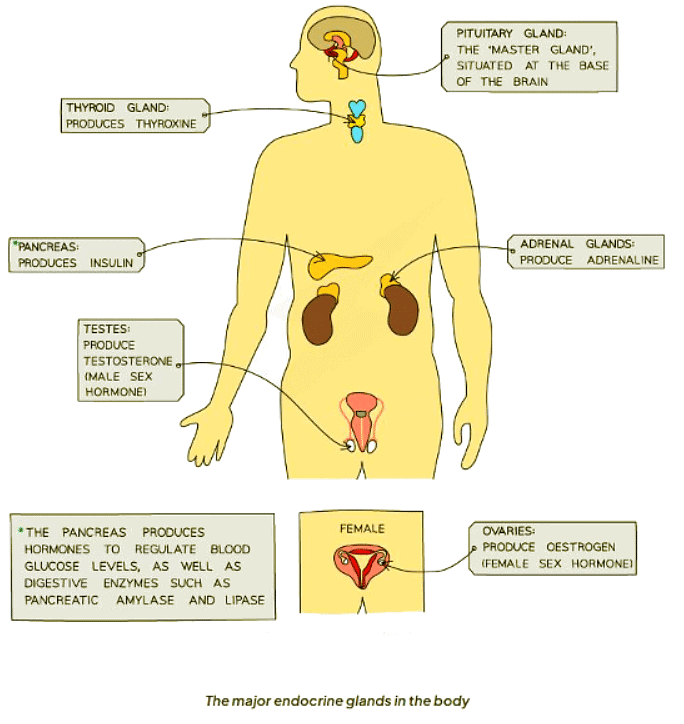
Transport around the body
- Endocrine glands are well-vascularized to ensure rapid release of hormones into the bloodstream. This allows hormones to swiftly reach their target organs and elicit a response.
- Hormones exert their effects by binding to specific receptors on target cells, which can be located either on the cell membrane or within the cell. Receptor-hormone binding occurs only if the receptor is complementary to the hormone.
- The liver plays a crucial role in regulating hormone levels in the blood by metabolizing or breaking down any excess hormones.
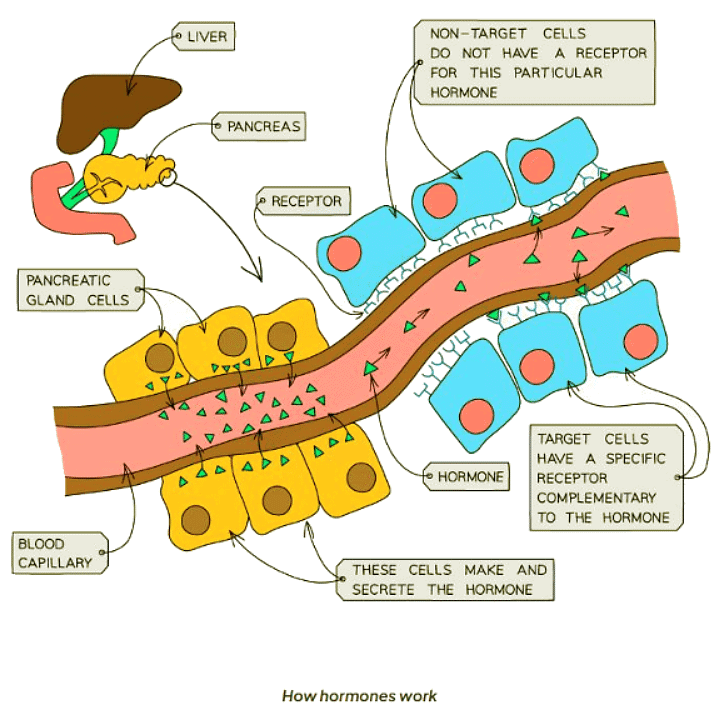
Important hormones in the human body:
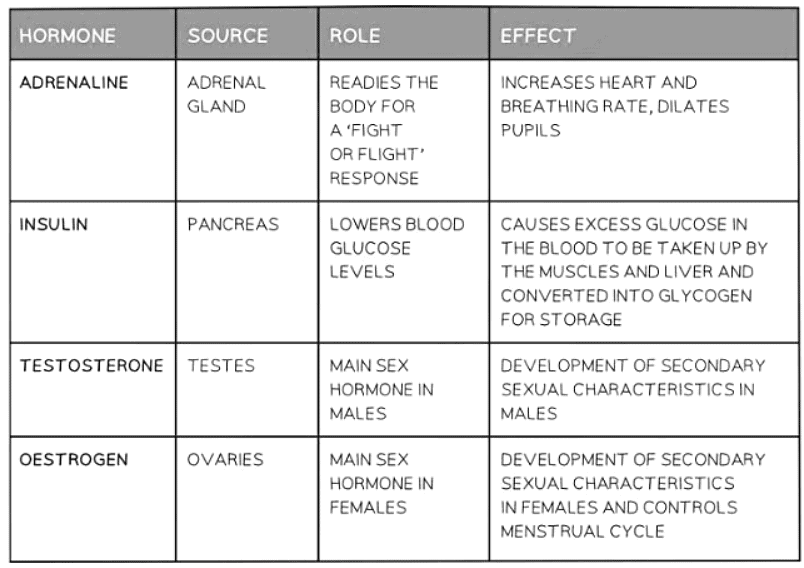
Comparison of Nervous & Hormonal Control
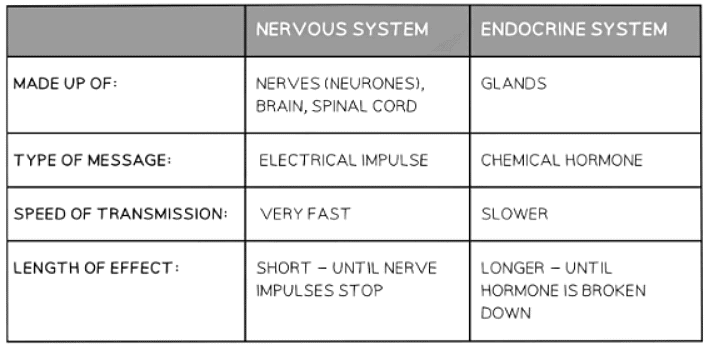
Glucagon
- Blood glucose levels are regulated through a negative feedback loop orchestrated by two pancreatic hormones: insulin and glucagon.
- Insulin and glucagon, both originating in the pancreas, govern blood glucose concentrations.
- Insulin is secreted in response to elevated blood glucose levels, prompting liver and muscle cells to convert surplus glucose into glycogen for storage.
- Conversely, glucagon is released when blood glucose levels drop, signaling liver and muscle cells to break down stored glycogen into glucose for release into the bloodstream.
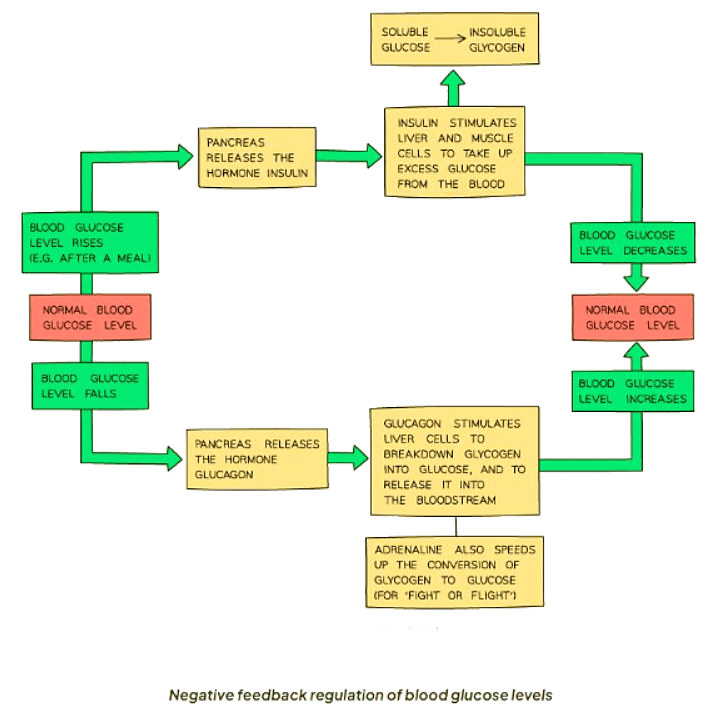
The Hormone Adrenaline
- Adrenaline, also called the 'fight or flight' hormone, is secreted in situations where the body perceives danger.
- In the context of this hormone, 'flight' refers to swiftly removing oneself from a perilous scenario, such as running away, while 'fight' indicates resorting to physical combat if fleeing is not an option to overcome the danger.
- Its primary function is to prepare the body for action, specifically geared towards movement, whether to fight or flee.
- Adrenaline triggers several physiological responses in the body to facilitate this readiness for action, including:
- Heightening blood glucose levels to enhance respiration in muscle cells.
- Accelerating both pulse and breathing rates, ensuring swift delivery of glucose and oxygen to muscle cells while efficiently removing carbon dioxide from them.
- Redirecting blood flow towards muscles and away from non-essential body parts like the alimentary canal, ensuring that respiratory substrates are readily available.
- Dilating pupils to maximize light intake, aiding in sending more information to the brain.
More on Adrenaline
Additional effects of adrenaline include:
- Elevating blood glucose concentration serves to supply muscles with ample glucose for energy production during heightened activity.
- Accelerating heart rate achieves a similar objective, ensuring optimal readiness of all muscles for heightened activity during a fight-or-flight response.
Question for Hormones in HumansTry yourself: Which gland is responsible for the secretion of adrenaline?View Solution
The document Hormones in Humans | Biology for GCSE/IGCSE - Class 10 is a part of the Class 10 Course Biology for GCSE/IGCSE.
All you need of Class 10 at this link: Class 10
|
101 videos|193 docs|33 tests
|
FAQs on Hormones in Humans - Biology for GCSE/IGCSE - Class 10
| 1. What are hormones and what are their associated glands? |  |
Ans. Hormones are chemical messengers that are produced by various glands in the body and are released into the bloodstream to regulate specific functions. Some examples of hormones and their associated glands include insulin from the pancreas, adrenaline from the adrenal glands, and thyroid hormone from the thyroid gland.
| 2. How does the control of the body differ between the nervous system and hormonal system? |  |
Ans. The nervous system uses electrical signals to quickly transmit information and control bodily functions, while the hormonal system uses chemical messengers (hormones) that are released into the bloodstream to regulate various processes more slowly but over a longer period of time.
| 3. What is the hormone glucagon and what is its role in the body? |  |
Ans. Glucagon is a hormone produced by the pancreas that works to increase blood sugar levels by stimulating the liver to convert stored glycogen into glucose. This helps to maintain a steady supply of energy for the body, especially during times of fasting or low blood sugar levels.
| 4. What is adrenaline and how does it affect the body in times of stress or danger? |  |
Ans. Adrenaline, also known as epinephrine, is a hormone produced by the adrenal glands in response to stress or danger. It triggers the body's "fight or flight" response, increasing heart rate, dilating airways, and providing a surge of energy to help the body react quickly in potentially dangerous situations.
| 5. How do hormones play a role in human physiology and why are they important for overall health? |  |
Ans. Hormones play a crucial role in regulating various bodily functions such as metabolism, growth, reproduction, and stress response. They help to maintain homeostasis and ensure that different systems in the body work together harmoniously. Imbalances in hormone levels can lead to various health issues, highlighting the importance of proper hormone regulation for overall health and well-being.
Related Searches














